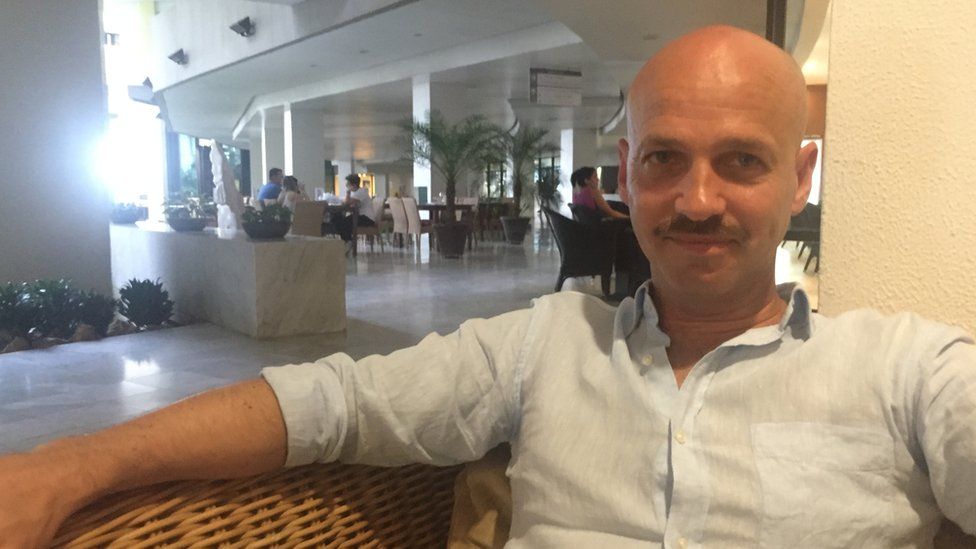Colombia Farc: The Norwegian who helped broker peace
- Published

A peace agreement for Colombia has finally been signed in Havana, after four years of negotiation presided over by hosts Cuba and Norway. The BBC's Will Grant in the Cuban capital met the Norwegian man who played a central role.
The relief in the room was palpable. As the former enemies walked in dressed in white, there were smiles and warm handshakes, even embraces ahead of the announcement that Colombians have spent decades waiting to hear: a final peace agreement between the Farc left-wing rebels and the Colombian government.
First though, a symbolic moment of national unity. The entire room stood up and with one voice, leftist guerrillas and former generals, rebel commanders and career diplomats, all sang the Colombian national anthem.
At one end of the main table, occupying a place he has filled for more than four years, was a slender, bald man with a well-groomed moustache. He listened respectfully to the anthem without singing along although by now he probably knows the words.
But it is not his country's song. He is Dag Nylander, head of the Norwegian diplomatic team which - along with the hosts, Cuba - acted as guarantors for the Colombian peace process.
For long-standing observers of Colombia's negotiations, Mr Nylander is a familiar sight. He has been a ubiquitous presence at every key moment over the past few years, reading out the details of the accords in his flawless but accented Spanish. At points of high tension or finger-pointing, he seemed to bring a calming presence to the proceedings, an external voice and a Norwegian sense of order to an entangled and bitter dispute.
I caught up with him after the heady sense of elation of that night had subsided a little.
"We did have a few Cuban cigars and some rum," he admits but more in "relief" at completing a job well done than with any sense of victory.
Hardly surprising he and the other negotiators allowed themselves a little celebration. The peace talks are often said to have lasted around four years. In the case of Mr Nylander and other key participants, it was probably closer to six once the secret preparatory talks are included.
"It's difficult to understand that this phase is really over," he tells me in a Havana hotel, not far from the one he has been based in for much of the past decade.
"It has been very demanding, it has been the main occupation of my life. I've been spending 24 hours a day, 7 days a week, all year round [on the peace process]. So it's been quite all-consuming."
Watch the moment the Colombian President and Farc leader shake hands after signing the historic deal
When formal talks in Havana started in November 2012, few would have predicted that they would take so long. In retrospect, did people underestimate the size of the task?
"I remember one or even both parties having expectations that this would last months, not years," Mr Nylander recalls.
"In hindsight, that was obviously not realistic. Could we have done it faster? Maybe. Did we get a solid, well thought-through peace agreement in the end? Absolutely. And I think that is the important thing."
Reaching that point has not been plain sailing though, not by any stretch of the imagination. Indeed there were times when it looked like the entire process might collapse completely.
"It was always external factors," says the Norwegian diplomat of the hardest moments.
"The parties were negotiating during conflict. So the biggest crisis was when 11 government soldiers were killed in Colombia by the Farc. President Santos ordered aerial bombings to resume, resulting in a high number of Farc deaths, including people we knew who had been sitting at the negotiating table."
Football and diplomacy
Despite those challenges, it seems the two sides' shared concept of Colombia was ultimately stronger than their sharp differences.
"These are Colombians, they have a joint history and a joint culture. Many of them had met before, both on the battlefield and at the negotiating table."
There was even scope for the occasional light-hearted moment.
"For example, at one of the first meetings one of the parties was watching a football game. Colombia versus Venezuela, if I'm not mistaken. And that was an important icebreaker."
"Football always helps!" he jokes.
He is fulsome in his praise of Cuba, too, for giving "huge support" to Colombia and hosting the talks with "the added value of having great credibility" with both the Colombian government and, especially, the Farc.
As for Mr Nylander himself, he too had to adapt to Colombian idiosyncrasies.
"If you ask my friends and family back in Norway, they'd say I have a couple of Colombian or Latin American elements in me now. Even to the point of turning up late for meetings which is permissible in Latin American culture but doesn't really work in Norway," he says, no longer wearing a watch on his wrist.
"Still, if you ask the parties here, they'd probably say I'm a typical Norwegian!"
- Published8 August 2018
- Published6 October 2016
- Published24 November 2016